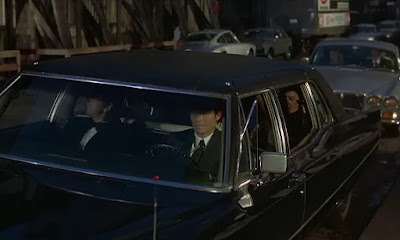Francés | Subs: Castellano/English/Portugués/Italiano/Français
101 min | x264 960x576 | 2650 kb/s | 192 kb/s AC3 | 24 fps
2,02 GB
El discreto encanto de la burguesía
Magnífica película del aragonés Luis Buñuel que se erige como la mejor obra de su última etapa francesa junto a Belle de Jour. Tal y como él mismo mencionó en una ocasión, si en El Ángel exterminador
un grupo de burgueses se encontraban con el problema de que no podían
abandonar la habitación en la que se encontraban después de haber
celebrado una lujosa cena, en El discreto encanto de la burguesía el conflicto de los protagonistas es que nunca pueden llegar a celebrar esa cena.
Los protagonistas son dos matrimonios (los Thévenot y los Sénéchal) y
Don Rafael Costa, embajador del imaginario país sudamericano de Miranda.
Durante todo el film sus intentos por reunirse y tener una plácida cena
son interrumpidos por causas diversas hasta que, en la parte final,
Buñuel empieza a jugar con los sueños haciendo que realidad y ficción se
entrelacen hasta no saber donde empieza una y termina la otra.
Exceptuando a Don Rafael Costa, no sabemos gran cosa del oficio de los otros dos hombres pero sí que se nos muestra que están involucrados en asuntos turbios de tráfico de drogas y además hay un grupo terrorista que va apareciendo intermitentemente a lo largo del film. El llevar una vida delictiva oculta bajo esa fachada de lujo y exquisitez era sin duda un tema jugoso para Buñuel, pero el director apenas se detiene en este punto y prefiere conducir el film por el terreno del surrealismo puro y duro. De hecho en más de una ocasión evita que oigamos ciertas conversaciones que podrían darnos luz sobre esos personajes introduciendo repentinamente un molesto ruido que impide que oigamos lo que dicen, una manera bastante traviesa de jugar con el espectador...
Exceptuando a Don Rafael Costa, no sabemos gran cosa del oficio de los otros dos hombres pero sí que se nos muestra que están involucrados en asuntos turbios de tráfico de drogas y además hay un grupo terrorista que va apareciendo intermitentemente a lo largo del film. El llevar una vida delictiva oculta bajo esa fachada de lujo y exquisitez era sin duda un tema jugoso para Buñuel, pero el director apenas se detiene en este punto y prefiere conducir el film por el terreno del surrealismo puro y duro. De hecho en más de una ocasión evita que oigamos ciertas conversaciones que podrían darnos luz sobre esos personajes introduciendo repentinamente un molesto ruido que impide que oigamos lo que dicen, una manera bastante traviesa de jugar con el espectador...
Ver nota completa en El Gabinete del Doctor Mabuse
The Discreet Charm of the Bourgeoisie
In this surrealist satire reminiscent of his earlier L'Age d'Or (1930) and The Exterminating Angel
(1962), Luis Buñuel leavens his attack on class privilege with light
comedy. With a narrative that interweaves flashbacks within dreams
within a dream, Buñuel interrogates the absurdities of bourgeois
ceremony and hypocrisy, as two well-heeled couples and their two
friends, including a drug-running South American ambassador, can't
conduct a dinner party in peace
Foiled by (among other things) botched scheduling, sexual desire, a
theater audience, an untimely funeral, and armed revolutionaries, the
sextet's inability to eat increasingly suggests a manifestation of their
innermost fears, while Buñuel's repeated interruptions of the story
cheekily defy movie conventions and straightforward interpretations.
Eschewing both a musical score and anything resembling closure, Buñuel
renders the film as unsettling as it is funny, as the bourgeoisie
soldier on towards a meal they never have. Internationally acclaimed for
its sharp wit and technical virtuosity, The Discreet Charm of the Bourgeoisie
won the National Society of Film Critics' Best Picture Prize and the
1972 Best Foreign Film Oscar, confirming once again Buñuel's place as
one of cinema's greatest experimental artists and satirists.
BR rip y capturas de LittleAfterAll
ººººººººº









No hay comentarios.:
Publicar un comentario